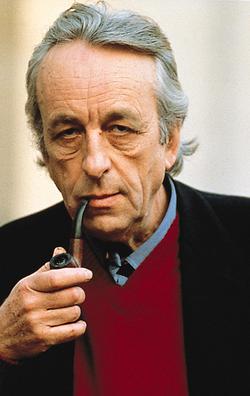Related Research Articles

Historicism is an approach to explaining the existence of phenomena, especially social and cultural practices, by studying their history; that is, by studying the process by which they came about. The term is widely used in philosophy, anthropology, and sociology.

Louis Pierre Althusser was a French Marxist philosopher who studied at the École normale supérieure in Paris, where he eventually became Professor of Philosophy.

In social theory and philosophy, antihumanism or anti-humanism is a theory that is critical of traditional humanism, traditional ideas about humanity and the human condition. Central to antihumanism is the view that philosophical anthropology and its concepts of "human nature", "man" or "humanity" should be rejected as historically relative, ideological or metaphysical.
Freudo-Marxism is a loose designation for philosophical perspectives informed by both the Marxist philosophy of Karl Marx and the psychoanalytic theory of Sigmund Freud. Its history within continental philosophy began in the 1920s and '30s and running since through critical theory, Lacanian psychoanalysis, and post-structuralism.
Warren Montag is a professor of English at Occidental College in Los Angeles, California. He is known primarily for his work on twentieth-century French theory, especially Althusser and his circle, as well as his studies of the philosophers Spinoza, Locke, and Hobbes.
20th-century French philosophy is a strand of contemporary philosophy generally associated with post-World War II French thinkers, although it is directly influenced by previous philosophical movements.

Louis Althusser and the Traditions of French Marxism is a 2005 book about the French philosopher Louis Althusser by William S. Lewis. The book received positive reviews. Lewis was complimented for his inclusion of translated documents of the French Communist Party.
Marxism is a method of socioeconomic analysis that originates in the works of 19th century German philosophers Karl Marx and Friedrich Engels. Marxism analyzes and critiques the development of class society and especially of capitalism as well as the role of class struggles in systemic, economic, social and political change. It frames capitalism through a paradigm of exploitation and analyzes class relations and social conflict using a materialist interpretation of historical development – materialist in the sense that the politics and ideas of an epoch are determined by the way in which material production is carried on.

For Marx is a 1965 book by the philosopher Louis Althusser, a leading theoretician of the French Communist Party (PCF), in which the author reinterprets the work of the philosopher Karl Marx, proposing an epistemological break between the young, Hegelian Marx, and the old Marx, the author of Das Kapital (1867–1883). The book, first published in France by François Maspero, established Althusser's reputation. The texts presented in For Marx are theoretical interventions in a definite conjuncture, particularly aiming at the definition of the lines to be pursued by the PCF after Stalin's years in the Soviet Union. Althusser's position is of theoretical antihumanism, and is against the teleology of history. Althusser defends that history is a process without subject and with an open end, but that has determinations that can be theorized by the science of history as constructed by Marx in his mature work, Das Kapital. Society is then conceptualized as a complex whole articulated in dominance by the economy where several social practices co-exist with a relative autonomy, introducing the concept overdetermination to characterize the levels of effectivity.
Marxist humanism is an international body of thought and political action rooted in a humanist interpretation of the works of Karl Marx. It is an investigation into "what human nature consists of and what sort of society would be most conducive to human thriving" from a critical perspective rooted in Marxist philosophy. Marxist humanists argue that Marx himself was concerned with investigating similar questions.
In Marxist philosophy, reification is the process by which human social relations are perceived as inherent attributes of the people involved in them, or attributes of some product of the relation, such as a traded commodity.
John Lewis was a British Unitarian minister and Marxist philosopher and author of many works on philosophy, anthropology, and religion.
Structural Marxism is an approach to Marxist philosophy based on structuralism, primarily associated with the work of the French philosopher Louis Althusser and his students. It was influential in France during the 1960s and 1970s, and also came to influence philosophers, political theorists and sociologists outside France during the 1970s. Other proponents of structural Marxism were the sociologist Nicos Poulantzas and the anthropologist Maurice Godelier. Many of Althusser's students broke with structural Marxism in the late 1960s and 1970s.

The correct place of Karl Marx's early writings within his system as a whole has been a matter of great controversy. Some believe there is a break in Marx's development that divides his thought into two periods: the "Young Marx" is said to be a thinker who deals with the problem of alienation, while the "Mature Marx" is said to aspire to a scientific socialism.
Neo-Marxism is a collection of Marxist schools of thought originating from 20th-century approaches to amend or extend Marxism and Marxist theory, typically by incorporating elements from other intellectual traditions such as critical theory, psychoanalysis, or existentialism. Neo-Marxism comes under the broader framework of the New Left. In a sociological sense, neo-Marxism adds Max Weber's broader understanding of social inequality, such as status and power, to Marxist philosophy.
Marxist philosophy or Marxist theory are works in philosophy that are strongly influenced by Karl Marx's materialist approach to theory, or works written by Marxists. Marxist philosophy may be broadly divided into Western Marxism, which drew from various sources, and the official philosophy in the Soviet Union, which enforced a rigid reading of what Marx called dialectical materialism, in particular during the 1930s. Marxist philosophy is not a strictly defined sub-field of philosophy, because the diverse influence of Marxist theory has extended into fields as varied as aesthetics, ethics, ontology, epistemology, social philosophy, political philosophy, the philosophy of science, and the philosophy of history. The key characteristics of Marxism in philosophy are its materialism and its commitment to political practice as the end goal of all thought. The theory is also about the struggles of the proletariat and their reprimand of the bourgeoisie.
Dialectical materialism is a materialist theory based upon the writings of Karl Marx and Friedrich Engels that has found widespread applications in a variety of philosophical disciplines ranging from philosophy of history to philosophy of science. As a materialist philosophy, Marxist dialectics emphasizes the importance of real-world conditions and the presence of functional contradictions within and among social relations, which derive from, but are not limited to, the contradictions that occur in social class, labour economics, and socioeconomic interactions. Within Marxism, a contradiction is a relationship in which two forces oppose each other, leading to mutual development.
Western Marxism is a current of Marxist theory that arose from Western and Central Europe in the aftermath of the 1917 October Revolution in Russia and the ascent of Leninism. The term denotes a loose collection of theorists who advanced an interpretation of Marxism distinct from classical and Orthodox Marxism and the Marxism-Leninism of the Soviet Union.

Agon Hamza is a philosopher and a political theorist from Kosovo. Influenced by Žižek and his readings of German Idealism, Marx and Marxist tradition in general; his work develops further the Hegelian-Marxist concepts of state, religion and politics. He is the author of Althusser and Pasolini: Philosophy, Marxism and Film (2016). and the co-author of Reading Marx (2018) with Slavoj Žižek and Frank Ruda and From Myth to Symptom: The Case of Kosovo (2013) with Slavoj Žižek.
References
- ↑ Lewis, William (2009-10-16). "Louis Althusser". Stanford Encyclopedia of Philosophy.
- ↑ "Lenin and Philosophy by Louis Althusser 1968". www.marxists.org. Retrieved 2024-05-18.
- ↑ Bosteels, Bruno (2021-12-07). "From Marx to Heidegger: Oscar del Barco and the crisis of Marxism". Radical Americas. 6 (1). doi:10.14324/111.444.ra.2021.v6.1.021. ISSN 2399-4606.